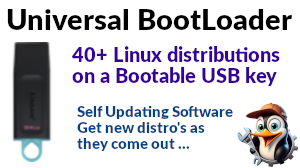I guess the first question to answer or clarify is what is it? If you listen to technical folk talking about Linux then one could be forgiven for thinking that it appears to mean different things to different people. If we were to look at a computer running what might be described as Linux, there are actually two distinct components;
- the Linux Kernel
- the supporting Libraries and programs which allow the user to interact with the Kernel
Whereas these supporting Libraries and programs are not actually a part of Linux itself, they are often supplied with the Kernel as what it termed a Linux distribution a term often shortened to distro.
So when someone asks which Linux are you using? , what they’re actually asking is which Linux distribution are you using?, as there is actually only one Linux (or Linux Kernel) albeit there are many versions which are released from time to time.
Why Linux
Still quite a popular question, unfortunately there are many (many) answers depending on your perspective and these have changed over time. Once upon a time the only convincing answer may have been because it’s free , but that doesn’t hold today. Over the last (nearly) 30 years, so much work has gone into the Linux kernel (and supporting programs) that it’s now just better than the alternatives. It’s always possible to argue over specific features that an alternative may have, but given the sheer weight of numbers of users (and commercial organisations) behind Linux , in the vast majority of instances, it’s going to be more stable, faster, and have more features than available alternative that might present itself.
So after processing all that, you still have to factor in, and it’s free!
Doesn’t everyone use Windows?
Well, it is still true (at the time of writing) that Windows has the majority of the market share when it comes to Desktop computers. However, this is not the case when we’re talking about servers or mobile devices, so on balance, strange as it may seem, the overall answer to that question is No.
I can’t switch, it’s all different!
Well, without resorting to asking how different things were following your last Operating System upgrade (!) Linux distributions come in many flavours, some of which so indeed looks quite different, but on the other hand there are some Linux distributions which look very similar to systems you might already be familiar with. That said, they all pretty much so the same things and generally in very similar ways, so they all come with hierarchical filesystems, have file managers, connect to printers and the Internet, and so on. What they don’t come with is what’s historically been termed the BSOD, but most people will accept this is a good thing …
Trying it out
The idea of switching to Linux can seem daunting, not least as typically it would involve overwriting your current operating system with what might seem like an unknown quantity. However, since as far back as 1993, Linux has supported the concept of a Live CD, which allows you to run the entire Operating System from CD without affecting anything currently installed on your computer. A number of companies will provide such CD’s for a nominal production fee (or indeed free of charge) or you can download a CD image and burn your own literally for the cost of a blank writable CD-ROM.
Getting Involved
There are a host of local Linux User Groups all over the UK, why not see what’s happening in your area.
If you’ve not tried it yet, why not give it a whirl, did I mention it’s free? , updates, also free, software, well for the most part, free .. and if you’re worried about it not being around tomorrow, well, it’s on more computers world-wide than any other operating system and we’re coming up on 30 years .. it started free and it’s still free.





